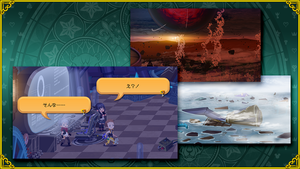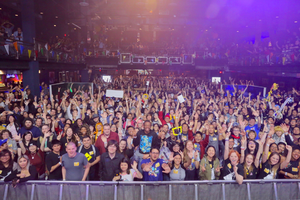The ideas expressed in this article are the express opinion of the author(s), and do not necessarily express the opinion of the Kingdom Hearts Database, its staff, or its contributors collectively.
If the Kingdom Hearts team truly wants to expand its fanbase, it needs to treat all its fans just as it does its Japanese fans.
This week, we saw the long-awaited (and perhaps semi-dragged-out) conclusion to the six-year journey that has been Kingdom Hearts Union χ (and, by extension, the nine-year journey that started with Kingdom Hearts χ). The final story quest, Quest 979, released on the Japanese version of the game on Monday (super early Monday for some). For many fans, it’s the end of an era that saw players insert themselves into the world of Kingdom Hearts as their own playable avatar. Much like the collection of titles itself, the games that have been often referred to as the χ Saga has spurred up its own community of fans of the unnamed Keyblade wielder, Ephemer, Skuld, and other Keyblade warriors from the time of the Keyblade War. Say what you will about the series' story, but the Kingdom Hearts series has long strived for that feeling of a theatrical performance on the video game stage.
The update, noticeably, released on the Japanese version only, with no officially localized version to accompany it for Western audiences. Within 18 hours, there were three different fan-made translations circulating the community from well-known translators: Cherrim[1], Everglow/CatBuntaichou[2], and KHInsider/Goldpanner[3]. The game concluded much as it has gone its entire run. Having originally released worldwide nearly six months after the Japanese version of the game, the global version of Kingdom Hearts Union χ has played catch-up to the Japanese version throughout nearly all its entire six-year run.
This practice stands out this week even more because the game just spent the last six months catching up the global version. Both versions of the game were on the same quest as of March 25, 2021. Yet, for whatever reason, the Japanese version of the game, and its Japanese audience, received the climactic conclusion while the rest of the global audience was left to make do with fan translations and speculation. This practice that the Kingdom Hearts team seems to still be employing of treating its Japanese audience with some sort of greater regard over its western audience by releasing new content in Japan first is not only out of place with most game companies in 2021, but it’s terribly out of place with what appears to be Square Enix’s own goals of expanding the fan base of the series.
World Premiere
Releasing games and updates to one set of audiences before another isn’t unheard of, or even new, but it’s out of place for video games in 2021. For the most part, games don’t have staggered, regional release schedules, including Square Enix games. The following table lists some of the most well-known titles of the last three or so years and their release dates:
| Game | Developer/Publisher | Release |
|---|---|---|
| Sid Meier’s Civilization VI | Firaxis Games/2K Games | WW: 21 Oct 2016 |
| Cuphead | Studio MDHR | WW: 29 Sep 2017 |
| Sonic Forces | Sonic Team/SEGA | WW: 7 Nov 2017
JPN: 9 Nov 2017 |
| Yakuza 0 | Ryu Ga Gotoku Studio/Sega | WW: 1 Aug 2018 |
| Dragon Quest XI Definitive Edition | Square Enix | WW: 27 Sep 2019 |
| Persona 5 Royal | P-Studio/Atlus | JPN: 31 Oct 2019
WW: 31 Mar 2020 |
| Ori and the Will of the Wisps | Moon Studios/Xbox Game Studios | WW: 11 Mar 2020 |
| Animal Crossing: New Horizons | Nintendo | WW: 20 Mar 2020 |
| Final Fantasy VII Remake | Square Enix | WW: 10 Apr 2020 |
| Trials of Mana | Xeen/Square Enix | WW: 24 Apr 2020 |
| The Last of Us Part II | Naughty Dog/Sony Interactive Entertainment | WW: 19 June 2020 |
| Ghost of Tsuhima | Sucker Punch Productions/Sony Interactive Entertainment | WW: 17 July 2020 |
| Microsoft Flight Simulator | Asobo Studio/Xbox Game Studios | WW: 18 Aug 2020 |
| Marvel’s Avengers | Crystal Dynamics/Square Enix | WW: 4 Sep 2020 |
| NBA 2K21 | Visual Concepts/2K Sports | WW: 4 Sep 2020 |
| Super Mario 3D All-Stars | Nintendo | WW: 18 Sep 2020 |
| Assassin’s Creed Valhalla | Ubisoft | WW: 10 Nov 2020 |
| Cyberpunk 2077 | CD Projekt Red | WW: 10 Dec 2020 |
| Balan Wonderworld | Balan Company/Square Enix | WW: 26 Mar 2021 |
| NieR Replicant ver 1.22474487139 | Toylogic/Square Enix | JPN: 22 Apr 2021
WW: 23 Apr 2021 |
It’s a little overkill, but the point here is that there aren’t really any major games releasing in the last 1.5 years in one part of the world before it releases in another part of the world. Most game developers and publishers release their titles simultaneously around the world. Even Square Enix does this: Final Fantasy VII Remake, Dragon Quest XI Definitive Edition, Trials of Mana, Balan Wonderworld, and Marvel’s Avengers, all titles published by Square Enix, released worldwide simultaneously. In fact, the only titles in the last year or so to have a regional release schedule are NieR Replicant ver. 1.22474487139 and Kingdom Hearts Melody of Memory.
Expanding the fanbase, yet leaving it out
This staggered release practice also contradicts Square Enix’s own apparent efforts to expand the Kingdom Hearts fan base. While the series has historically been spread out across multiple systems, Square Enix has made a huge effort in recent years to make it possible for any one to jump into the series. In the last four years, the company has re-released the entire series on the PlayStation 4 (2017), Xbox One (2019), PlayStation 5 and Xbox Series X and S (2020), and now Windows PCs via the Epic Games Store (2021). Additionally, Kingdom Hearts III was released in China for the first time ever. The series’ most recent entry, Kingdom Hearts Melody of Memory, released in more languages than any other title to date, including Arabic for the first time. All of this suggests a company that is seeking even more players and more fans.
So, if Square Enix is seeking to expand the Kingdom Hearts fan base, why are its non-Japanese audiences being treated as secondary fans? Why do titles release in Japan days or weeks or months before they release in North America, Europe, or Australia? Why does Japan consistently get comparably better or more valuable pre-order bonuses with the series releases than everyone else does? Why has Square Enix released content such as the Kingdom Hearts - III, II.8, Unchained χ & Union χ (Cross) - Original Soundtrack in Japan only? I have heard plenty of people in the community discuss their wishes for content like the soundtrack outside of Japan, yet the physical album is only available in Japan. And it's not that the fan-translations for these games and content are unreliable or bad; in fact, that there are fan translations so quickly after the update is a true credit to the translators. But it's not the fans' jobs to translate and provide their own content. That's why the game has a localization team in the first place. And there are plenty of similar scenarios over the years. If the Kingdom Hearts team truly wants to expand its fanbase, it needs to treat all its fans just as it does its Japanese fans.
The waiting game
The practice of releasing content in Japan (or any other region in the world) before releasing it elsewhere is out of date and does not fit with the team’s efforts to expand the Kingdom Hearts series’ fanbase. There are not many major video game titles with staggered, region-based releases, and it contradicts the team’s own efforts to make the series available to even more people.
It is hard to know exactly what the thinking or logic is at Square Enix for this practice, and so we should refrain from seeing a sinister plot in all of this. Additionally, recent decisions such as hosting the Kingdom Hearts Union χ Dandelion Meeting and Kingdom Hearts III Premiere, and letting Dark Horse republish the Kingdom Hearts Series Memorial Ultimania (now Kingdom Hearts Ultimania: The Story Before Kingdom Hearts III) and Kingdom Hearts Character Files in English speaks to a growing (if maybe slow) realization at Square Enix that continuing to shut out fans of the series from content and engaging events is a bad idea.
The conclusion of Kingdom Hearts Union χ has proven to be an emotional and thrilling ending to the series’ longest running and first smartphone game. It is a title that, despite its nontraditional quest-based gameplay, stretched-out Disney worlds, and controversial medal-pulling mechanics, ultimately forged its own place within the Kingdom Hearts community. In the end, however, the team chose to leave out a large part of that community as the game came to its end, preferring to lock people out of the theater just as the performance moves to its dramatic and long-awaited finale.
Sources
- ↑ Cherrim @ khux spoilers (@petalscythe) on Twitter: "KHUX Final Story Translation
It should go faster from here, but in case I need to go to bed before I finish, I'm just gonna release this by cutscene. Sorry this is so slow-going!!
Here's the first scene. Will update this doc as I complete more." - ↑ EvergloW ※ (@everglow8444) on Twitter: "There we go! Huge thanks to everyone who supported me today, I was actually pleased to see so many people interested in the ending of KHUX. I owe this game a lot, so I'm both proud and happy I could work on the most important translation one last time."
- ↑ KHInsider (@Daybreak_Town) on Twitter: "Translations by @_KH_ENGLISH are now available! Subtitled videos coming soon"


